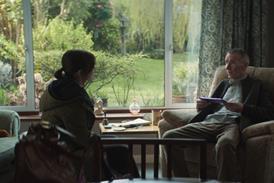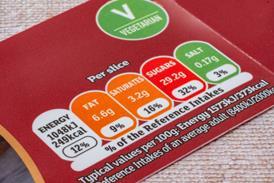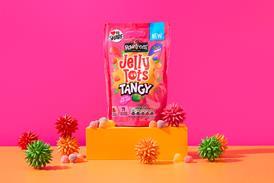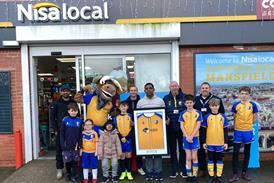Britain has always had a love affair with tea. From tired feet to a bereavement, the Great British Cuppa can help alleviate all manner of ills, and now retailers are using it to boost their profits.
With the credit crunch biting, retailers are trying to do all they can to pull in the punters, and tea – along with its darker cousin coffee – is proving to be the solution in the form of the in-store café.
Take Surrey-based independent Dean Holborn, for example. Dean was keen to diversify at Holborn’s, his small South Nutfield store, which is conveniently located next to a primary school. He wanted a simple offer that would prove popular with the area’s yummy mummies, but he didn’t want to spend a fortune on it.
And he didn’t have to. Dean found a Tchibo-branded hot drinks machine at this year’s Convenience Retailing Show which the company was happy to give to him free on loan.
“Apart from being free, I also liked the fact that it was branded with Tchibo,” he says. “The company has a store in Redhill so my customers know and trust it.”
Dean shelled out £200 for a plumber to run a water supply to the machine, and was also lucky enough to take advantage of an offer that Booker was running on bistro chairs and tables, which he placed outside his store. “So far it has been really well received by my customers, so I am thrilled with it,” he says.
Parents and nannies have started to arrive early for the school pick-up in order to grab a hot drink and have a natter outside Dean’s store, and he’s expecting to see a substantial lift in sales once the school term gets back into full swing.
The Tchibo machine has its own cleaning cycle which takes 10 minutes each night so health and hygiene is not an issue, he adds.
Not all retailers have the option of creating a seating area in or outside their stores, but this doesn’t have to stop them benefiting from a hot drinks offer, says Nestlé Professional marketing director Martin Lines.
At just 420mm wide and 393mm deep the Nescafé & Go system can be fitted into even the smallest of stores. And once it’s plugged in the dinky drinks machine can add hundreds of pounds to a retailer’s bottom line with next to no effort on their part. “Our customers tell us that the Nescafé & Go system earns them significant revenue, enabling them to attract custom and increase spend per visit,” adds Lines. It holds a choice of six hot drink varieties including tea coffee and hot chocolate and pours drinks within 10 seconds.
The machine costs £239 plus VAT for the dispenser, and selling just 20 cups a day at £1.10 each means that £3,400 profit a year can be generated for the retailer.
London-based retailer Kirit Patel says that his machine tops that, bringing in £6,000 in sales every year. “Customers come in wanting a newspaper or pastry, but when they see the Nescafé & Go machine they buy a coffee as well. I’m serving more than 20 cups a day now and with 60p profit in every cup that’s valuable extra business.”
The village attracts hordes of holidaymakers in the summer months thanks to its large caravan parks and campsites. A natural reef also means that it’s a popular place for surfers. However, there wasn’t really anywhere for people to sit and have a quick bite to eat and drink, until now. As a result, the cafe was an instant hit after its opening in August. reports Derek.
Customers must go through the store to reach the café and Derek has already noticed an uplift in the store’s sales as a result of the increased traffic.
He is also planning on running cross-promotions between the store and the café in the quieter winter months to keep up momentum. “I was thinking of running an offer whereby if you spend £10 in the shop you could get a free cup of tea or a slice of cake,” he says.
But running the café, which can seat up to 50 people, isn’t exactly plain sailing, explains Derek. “I must confess that running the café alongside the store hasn’t been as easy as I thought,” he says. “It’s incredibly demanding and a lot more time-consuming than I had expected. The floors must constantly be swept, tables kept spotless, cutlery and cups cleaned and, of course, the food has to be top-notch. It’s very labour intensive, but all worth it when customers tell you they like it.”
Derek’s now planning on renting the space out to locals for functions, and already has a booking by the Borth Book Club for later this year. “Convenience stores have always been popular meeting places for members of the local community, and having an in-store café really takes this to the next level. It provides a wonderful service for the community,” he adds.
Another retailer who has his work cut out with his foodservice offer is Kishor Patel. He has recently purchased a former tandoori take-away outlet just a stone’s throw away from one of his Nisa stores in Houghton Regis, near Luton.
In the next few months he plans to transform the old Rupa Tandoori into a sparkling new café which will serve hot and cold foods as well as traditional curry dishes throughout the day and well into the night.
Customers will also have free internet access, or be able to watch TV while they wait for their food. Like Derek, Kishor plans to cross-promote between his convenience store and the café. “I may give out vouchers for a half-price tandoori at the store, and vice versa,” he says.
Providing the venture is successful, Kishor hopes to open a similar offer within one of his larger stores. “Times have moved on,” he says. “Running a convenience store is not what it used to be. Our main categories are shrinking. Tinned groceries, for example, have all but gone, to be replaced by chilled produce. Even household products are struggling as more people bulk buy online.
“It’s very difficult to compete against this, so we have to reposition ourselves to ensure that profitability is maintained and, in my opinion, an in-store café area or some other kind of hot drinks and food offer is the way to go.”
With the credit crunch biting, retailers are trying to do all they can to pull in the punters, and tea – along with its darker cousin coffee – is proving to be the solution in the form of the in-store café.
Take Surrey-based independent Dean Holborn, for example. Dean was keen to diversify at Holborn’s, his small South Nutfield store, which is conveniently located next to a primary school. He wanted a simple offer that would prove popular with the area’s yummy mummies, but he didn’t want to spend a fortune on it.
And he didn’t have to. Dean found a Tchibo-branded hot drinks machine at this year’s Convenience Retailing Show which the company was happy to give to him free on loan.
“Apart from being free, I also liked the fact that it was branded with Tchibo,” he says. “The company has a store in Redhill so my customers know and trust it.”
Dean shelled out £200 for a plumber to run a water supply to the machine, and was also lucky enough to take advantage of an offer that Booker was running on bistro chairs and tables, which he placed outside his store. “So far it has been really well received by my customers, so I am thrilled with it,” he says.
Parents and nannies have started to arrive early for the school pick-up in order to grab a hot drink and have a natter outside Dean’s store, and he’s expecting to see a substantial lift in sales once the school term gets back into full swing.
The Tchibo machine has its own cleaning cycle which takes 10 minutes each night so health and hygiene is not an issue, he adds.
Not all retailers have the option of creating a seating area in or outside their stores, but this doesn’t have to stop them benefiting from a hot drinks offer, says Nestlé Professional marketing director Martin Lines.
At just 420mm wide and 393mm deep the Nescafé & Go system can be fitted into even the smallest of stores. And once it’s plugged in the dinky drinks machine can add hundreds of pounds to a retailer’s bottom line with next to no effort on their part. “Our customers tell us that the Nescafé & Go system earns them significant revenue, enabling them to attract custom and increase spend per visit,” adds Lines. It holds a choice of six hot drink varieties including tea coffee and hot chocolate and pours drinks within 10 seconds.
The machine costs £239 plus VAT for the dispenser, and selling just 20 cups a day at £1.10 each means that £3,400 profit a year can be generated for the retailer.
London-based retailer Kirit Patel says that his machine tops that, bringing in £6,000 in sales every year. “Customers come in wanting a newspaper or pastry, but when they see the Nescafé & Go machine they buy a coffee as well. I’m serving more than 20 cups a day now and with 60p profit in every cup that’s valuable extra business.”
CAFE+
William Reed Business Media, publisher of Convenience Store and the company behind the Convenience Retailing Show (CRS), is launching a new area at the 2009 show called Café+, aimed at the booming in-store café, sandwich and coffee shop market.
Café+ aims to put owners and operators in touch with suppliers who can help them drive footfall and increase their sales. With this in mind, Café+ 2009 will also include a Café+ Live area where visitors can attend workshops and see live demonstrations. The Profit Sandwich event will inform visitors about those sandwiches which are guaranteed to drive footfall and customer loyalty, while Smoothie Live will show how fresh smoothies can liven up retailers’ takings.
Visitors to Café+ will also be able to take advantage of all that CRS has to offer – not least of all the chance to meet up with suppliers of ancillary products such as soft drinks, confectionery, crisps and snacks. The event will run at the NEC, Birmingham, from March 1-3, 2009.
Nisa retailer Derek Edwards is doing things on a much grander scale, though. After many months of deliberation and planning, Derek decided to take the plunge and convert the large glass-fronted room above his store in the picturesque seaside village of Borth, Mid Wales, into a high-class café.
William Reed Business Media, publisher of Convenience Store and the company behind the Convenience Retailing Show (CRS), is launching a new area at the 2009 show called Café+, aimed at the booming in-store café, sandwich and coffee shop market.
Café+ aims to put owners and operators in touch with suppliers who can help them drive footfall and increase their sales. With this in mind, Café+ 2009 will also include a Café+ Live area where visitors can attend workshops and see live demonstrations. The Profit Sandwich event will inform visitors about those sandwiches which are guaranteed to drive footfall and customer loyalty, while Smoothie Live will show how fresh smoothies can liven up retailers’ takings.
Visitors to Café+ will also be able to take advantage of all that CRS has to offer – not least of all the chance to meet up with suppliers of ancillary products such as soft drinks, confectionery, crisps and snacks. The event will run at the NEC, Birmingham, from March 1-3, 2009.
The village attracts hordes of holidaymakers in the summer months thanks to its large caravan parks and campsites. A natural reef also means that it’s a popular place for surfers. However, there wasn’t really anywhere for people to sit and have a quick bite to eat and drink, until now. As a result, the cafe was an instant hit after its opening in August. reports Derek.
Customers must go through the store to reach the café and Derek has already noticed an uplift in the store’s sales as a result of the increased traffic.
He is also planning on running cross-promotions between the store and the café in the quieter winter months to keep up momentum. “I was thinking of running an offer whereby if you spend £10 in the shop you could get a free cup of tea or a slice of cake,” he says.
But running the café, which can seat up to 50 people, isn’t exactly plain sailing, explains Derek. “I must confess that running the café alongside the store hasn’t been as easy as I thought,” he says. “It’s incredibly demanding and a lot more time-consuming than I had expected. The floors must constantly be swept, tables kept spotless, cutlery and cups cleaned and, of course, the food has to be top-notch. It’s very labour intensive, but all worth it when customers tell you they like it.”
Derek’s now planning on renting the space out to locals for functions, and already has a booking by the Borth Book Club for later this year. “Convenience stores have always been popular meeting places for members of the local community, and having an in-store café really takes this to the next level. It provides a wonderful service for the community,” he adds.
Another retailer who has his work cut out with his foodservice offer is Kishor Patel. He has recently purchased a former tandoori take-away outlet just a stone’s throw away from one of his Nisa stores in Houghton Regis, near Luton.
In the next few months he plans to transform the old Rupa Tandoori into a sparkling new café which will serve hot and cold foods as well as traditional curry dishes throughout the day and well into the night.
Customers will also have free internet access, or be able to watch TV while they wait for their food. Like Derek, Kishor plans to cross-promote between his convenience store and the café. “I may give out vouchers for a half-price tandoori at the store, and vice versa,” he says.
Providing the venture is successful, Kishor hopes to open a similar offer within one of his larger stores. “Times have moved on,” he says. “Running a convenience store is not what it used to be. Our main categories are shrinking. Tinned groceries, for example, have all but gone, to be replaced by chilled produce. Even household products are struggling as more people bulk buy online.
“It’s very difficult to compete against this, so we have to reposition ourselves to ensure that profitability is maintained and, in my opinion, an in-store café area or some other kind of hot drinks and food offer is the way to go.”
















No comments yet